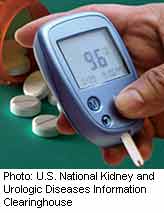CGM glucose values increased versus blood glucose meter values in acetaminophen challenge
WEDNESDAY, Aug. 19, 2015 (HealthDay News) — Acetaminophen falsely increases continuous glucose monitor (CGM) glucose values, according to an observation letter published online Aug. 12 in Diabetes Care.
David M. Maahs, M.D., Ph.D., from the University of Colorado in Aurora, and colleagues examined the magnitude of the effect of acetaminophen on CGM glucose, particularly in the outpatient setting with contemporary sensor technology. The authors examined the potential challenges to closed-loop systems by performing the acetaminophen challenge in 40 individuals with hemoglobin A1c 7.3 ± 0.8 percent. Participants ingested 1,000 mg acetaminophen and obtained blood glucose (BG) meter readings over eight hours after ingestion.
The researchers found that for eight hours after acetaminophen ingestion there were significant differences (P ≤ 0.01 for all), consistent with expected pharmacokinetics. The greatest mean difference was 61 mg/dL. There was considerable individual variation; over eight hours, 50 percent of relative differences were within 20 percent and an additional 26 percent were within 40 percent. Three subjects had a BG meter value of <70 mg/dL with higher CGM readings, while 10 had a CGM >180 mg/dL and a BG meter value that was lower by more than 100 mg/dL.
“These data have implications for use of CGM glucose as a replacement for meter glucose for diabetes decision making and for closed-loop systems using CGM glucose values for automated insulin delivery,” the authors write.
Several authors disclosed financial ties to the pharmaceutical and medical device industries.
Full Text (subscription or payment may be required)
Copyright © 2015 HealthDay. All rights reserved.








